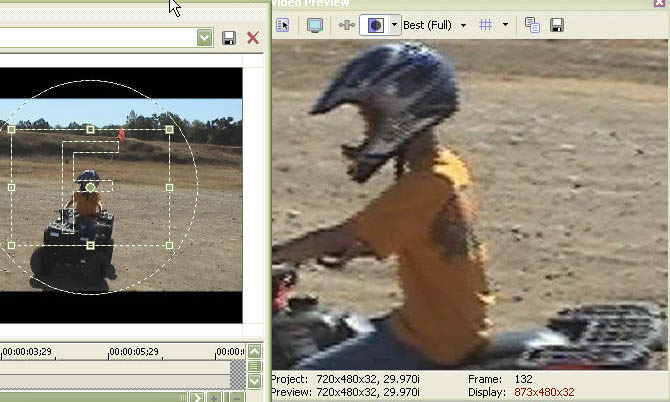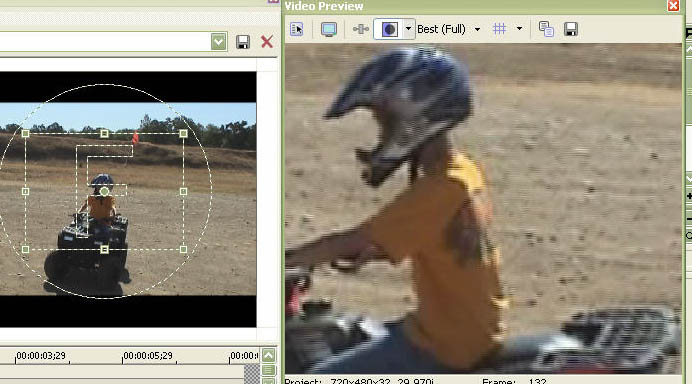I'm working on a project that will untimately be a 15 minute video segment. I'm using a DV camera, capturing the video via Firewire, using Vegas to edit and output as a MPG movie. I'm then using DVDLab to author a DVD. This is all NTSC if that matters.
What's happening is on ANY and ALL clips that I have zoomed in on, the final video seems to suffer from interlace artifacts. I've had this happen on a few different clips that I've done, but this one seems to have a ton and I can't ignore them any longer.
The artifacts are there on the TV and a computer when played back. All the other clips I've used appear to be just fine, just the zoomed in clips.
Any thoughts?
I haven't made any changes to the media properties. They are all set to lower field first.
+ Reply to Thread
Results 1 to 8 of 8
-
-
Originally Posted by kirky99
Are you sure you aren't deinterlcing?
First thought, zoom is ok for analysis but unfair as a final judgement. The PC is probably deinterlacing that zoom. Cap a frame from Vegas and post that.
 Recommends: Kiva.org - Loans that change lives.
Recommends: Kiva.org - Loans that change lives.
http://www.kiva.org/about -
Well I have had the same problem here, and the only way around it I have found is to set the De-interlace method to Blend fields in the Project properties, this will eliminate the problem. You can still render the video as interlace at the final render. I am not sure if it actually De-interlaces the video or if it only de-interlaces it for editing purposes.
Deek -
I haven't tried anything yet, here's the current project settings.Originally Posted by edDV

And a screen cap of the preview window. THis is basically what it looks like on the TV as well. I didn't notice, and it's interesting to see, but the overlay of her name is NOT impacted in any way, but clearly the video is showing some "issues".

Let me know if you think of anything else, I'll report back if I figure it out as well.
UPDATE: Actually, in reading the replies, I wanted to make sure I was explaining myself correctly. I'm not zooming in to check on quality. What I've done, is some of the clips I want to use are too "distant" so I use the Event Pan/Crop option to zoom in on certain portions of the clip. Only the clips that I have used the Event Pan/Crop tool on show the interlace artifacts on the final video. Hope that explains a little better. -
Here is an example of what I came up with. I thank this is the same thing you are doing.
The first image, I had de-interlace in the project properties set to none.
The second was set to Blend fields.


-
I don't quite understand what you are trying to do. Is the target a TV set? Then interlace is what you want.
Do you need to zoom the video as an effect? Vegas will internally handle that as it renders and then reinterlace the output frames for that portion of the timeline.
None of these software based NLE's work in real time They attempt to give you a working preview. You need to process the effect to see the final result.
My suggestion is you fully render and burn test clips and evaluate them on a playback DVD on a TV set. The computer monitor will always show display interlace affects. It's a progressive monitor. If you deinterlace the display, you will see other distortions resulting from the deinterlace. Vegas assumes you will be monitoring from an interlace TV attached to your camcorder.
Added:
I reread your posts, I think I know what is happening.
When you zoom into a video clip, interpolation must be used to add the intermediate pixels needed to fill out the frame. Deinterlaced frames are created in the effect area. The deinterlace setting in the project folder sets the mode of deinterlacing used in the frames of the effect.
From Vegas Help
"Blend fields - Uses contents from both fields and works well for high-detail, low-motion video."
"Interpolate - Uses a single field at a time and works well for high-motion, low-detail video."
When the effect is rendered, the new full frames are reinterlaced for DV output.
I just ran a test. Keep in mind that there are limits to zooming into the picture before artifacts take over. A TV monitor (attached to the camcorder) quickly reveals how far you can go and shows the affects of blend and interpolate modes. I think blend will work best for your sample above.Recommends: Kiva.org - Loans that change lives.
http://www.kiva.org/about -
Yes, Deekkeed I think explained it a little better than I was. And yes, I understand the I do want the video to be interlaced for TV. I wasn't so concerend to see the interlaced artifacts on the Vegas preview, BUT when I rendered out the effects, authored and burned it to DVD, the same interlace artifacts were present on the TV.
Only when I paid attention to the footage and realized that the only segments that showed the "weird" behavior were clips that I actually zoomed in on during the editing phase.
I made a change to the Project Properties to De-Interlace Method: Blend did a final render appear acceptableonce rendered, authored and burned to DVD.
I do think you hit the nail on the head with your reasoning edDV. Each scanline is getting "zoomed" and thus shows when finally rendered, unless you do something to fix it. My zooms were, I thought, relatively slight. A massive zoom wouldn't look so pretty...
Thanks for the ideas, all is better... for now... -
To get better results (as the method edDV proposed) you will have to do interlaced resizing on these parts. Dunno if that's possible in Vegas.Only when I paid attention to the footage and realized that the only segments that showed the "weird" behavior were clips that I actually zoomed in on during the editing phase.
Similar Threads
-
Artifacts after ecnoding in Vegas
By Pragzs in forum Video ConversionReplies: 52Last Post: 4th Oct 2011, 18:49 -
How to de-interlace captured video without artifacts?
By krumm-krumm in forum EditingReplies: 10Last Post: 29th Sep 2011, 00:36 -
Weird artifacts in mp4 after rendering in Vegas, help?
By bojadada in forum RestorationReplies: 4Last Post: 1st Jun 2010, 18:03 -
Removing "interlace" artifacts
By gordonbennett in forum DVD RippingReplies: 2Last Post: 26th Apr 2010, 11:45 -
Interlacing artifacts appear from interlaced clips?? Sony vegas + tmpg
By mazinz in forum EditingReplies: 10Last Post: 28th Sep 2008, 19:51




 Quote
Quote